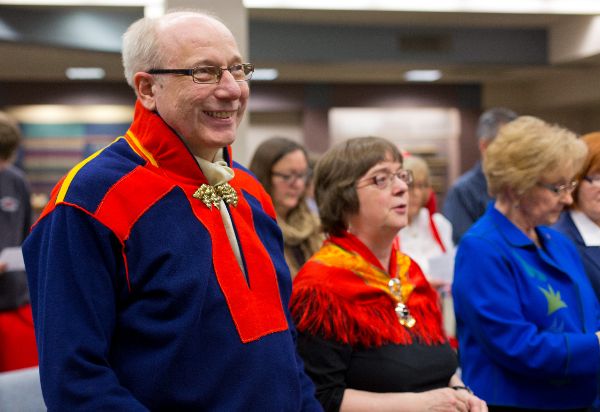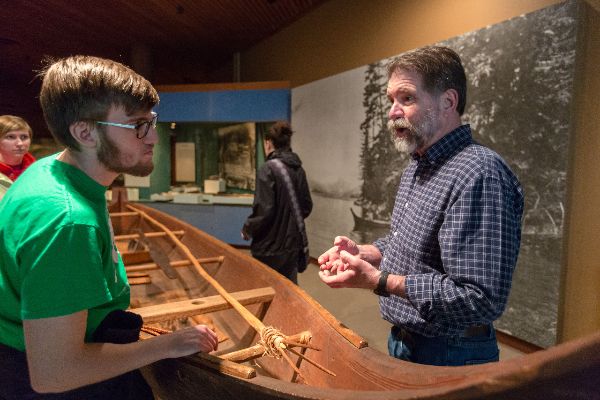Minor Requirements
22 semester hours completed with a grade of C- or higher
1. Core courses in Native American and Indigenous Studies
6 semester hours
Students must take the following core courses that introduce the field of Native American and Indigenous Studies and explore key approaches and issues within it.
- NAIS 111: Interconnections (1)
- NAIS 112: Interconnections (1)
- NAIS 250: Introduction to Native American and Indigenous Studies (4)
Quick Links


2. Northwest Language and Worldview
8 semester hours
Students will take 8 semester hours that explore Indigenous language and worldviews of the Pacific Northwest. Equivalent coursework or demonstrated fluency to an equivalent level in another Indigenous language may be substituted for SOLU 101 and SOLU 102.
- SOLU 101: Southern Lushootseed: Introduction to Oral Language (4)
And one of these four courses exploring Northwest Indigenous language and worldviews.
- NAIS 491: Independent Study (4)
- NAIS 495: Internship (4)
- RELI 397: Indigenous Traditions of the Pacific Northwest (4)
- SOLU 102: Southern Lushootseed: Oral Language Dialogue (4)
3. Electives
8 semester hours
Students select two of the following courses that study Indigenous topics and perspectives.
- ENGL 213: Topics in Literature/Themes and Authors (4) (when the topic is ‘Literature of the PNW’)
- ENGL 217: Topics in Literature (4) (when the topic is Native Literatures)
- ENGL 288: ST: Indigenous Literature of North America (4)
- HISP 322: Latin American Cultural Studies (4)
- HIST 333: Colonization and Genocide in Native North America (4)
- HIST 348: Lewis and Clark: History and Memory (4)
- HIST 351: History of Western and Pacific Northwestern U.S. (4)
- NAIS 230: Indigenous Creation Narratives of the Americas (4)
- NAIS 244: Environmental Justice and Indigenous Peoples (4)
- NAIS 286: Sámi Film and the Indigenous North (4)
- NAIS 321: Visual Sovereignty and Indigenous Film (4)
- NAIS 361: Storied Survivance (4)
- NAIS 363: Race and Indigeneity (4)
- NURS 404: Healthcare Diversity (4)
- RELI 227: Introduction to Christian Theologies (4) (when the topic is ‘Native American Theologies’)
- RELI 236: Native American Religious Traditions (4)
- RELI 397: Indigenous Traditions of the Pacific Northwest (4) (when not used to satisfy the Northwest Language and Worldviews requirement)
- SOLU 101: Southern Lushtootseed: Introduction to Oral Language (4) (when not used to satisfy the Northwest Language and Worldviews requirement)
- SOLU 102: Southern Lushootseed: Oral Language Dialog (4) (when not used to satisfy the Northwest Language and Worldviews requirement)
- Approved Study Away courses (4-8)
- Up to 8 study away semester hours may be applied toward the minor upon completion of PLU’s semester-long Gateway program in Oaxaca, when accompanied by an internship experience with an Indigenous-led organization. Students may also petition the chair to count up to 8 study away semester hours applied toward the minor from our Gateway program in Namibia or from our Featured programs in Australia and New Zealand.
Individualized Major in NAIS
Interested in going beyond the minor? Students are encouraged to consider a Major in NAIS. Majors are designed individually in consultation with NAIS faculty mentors. Tailored to meet your specific goals, each student’s pathway will be unique. Individualized Majors in NAIS often follow this pathway:
* Completing the requirements for the minor
* Adding 3 or more additional electives
* Including study away, internship, or other community-based project
* A final capstone project and presentation
If this will be a second major, students are encouraged to consider ways their major in NAIS might support or complement their existing major, perhaps through shared internships or major projects.
Interested? Reach out to the NAIS program Director or speak to any NAIS faculty member for more information.


